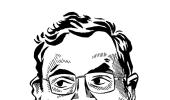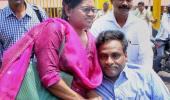'At this age we all know that death is inevitable, but everyone wants to die with dignity.'
'The judges have given the answer.'
Jyoti Punwani reports.

"In my opinion, the function of all law is to support and preserve life, not destroy it," Senior Advocate Indira Jaising tells Rediff.com, hours after her petition asking for bail for renowned poet Varavara Rao was granted by the Bombay high court.
"I was motivated by a number of factors: His deteriorating health, his age," she said, explaining why she took up Professor Rao's case at a time when he seemed condemned to waste away in jail.
"I asked myself the question: Does the law have anything to offer to him? At this age we all know that death is inevitable, but everyone wants to die with dignity. The judges have given the answer."
Granting Professor Rao bail for six months on medical grounds, the order by Judges S S Shinde and Manish Pitale says:
'Thus, the position of law, as it emerges from various pronouncements of the ... Courts, is that not only is a prisoner not deprived or denuded of his fundamental right guaranteed under Article 21.. when he is confined within the four walls of a prison but in special circumstances the walls of the prison can be breached to allow release of an accused from custody, subject to his being put to conditions which would act as a safety net...'
'Even if such old aged prisoners with various health conditions are accused of serious offences, the question is as to whether they can be forced to live a subhuman existence behind bars, only because they stand accused of serious offences?'
'With all humility at our command, keeping in view human consideration, the well recognised fundamental rights of the undertrial to have quality medical aid for serious ailments suffered by him, advanced age, inadequate facilities in the hospital attached to the Taloja Central Prison, we are of the opinion that this is a genuine and fit case to grant relief; or else, we will be abdicating our constitutional duty and function as a protector of human rights and right to health covered under right to life guaranteed by Article 21 of the Constitution of India.'
Finally, the right to life of 82-year-old Varavara Rao, accused in the Bhima Koregaon case, has been recognised by a court.
It took nine long months, during which the poet was sent back and forth between jail and hospital. Yet, the NIA court denied him bail on medical grounds.
Appeals to provide him the necessary medical treatment in a good hospital had been made repeatedly by national and international scholars and artistes, and also by 14 members of Parliament, but had left the authorities unmoved.
As far back as August last year, when it became clear that Professor Rao's mental and physical faculties were deteriorating rapidly in jail, Rediff.com had asked the question: 'Why is Varavara Rao being denied the right to health?'
What made the judiciary finally uphold Varavara Rao's fundamental right to health and life?
It took the passion and skills of senior lawyers Indira Jaising and Anand Grover.
Interestingly, Jaising was born in the same year as Varavara Rao: 1940. At 80, she continues doing what she has all her life: Fighting for those deprived of their human rights.
In the petition filed in November 2020 by Professor Rao's wife, Jaising argued that by failing to provide adequate medical treatment in custody to Rao, the state of Maharashtra, the NIA and the Taloja jail superintendent had violated Rao's fundamental right to health, dignity and life guaranteed under Art 21 of the Constitution, apart from violating international covenants pertaining to human rights.
The court was urged to exercise its powers as a Constitutional court to uphold the right to life of the undertrial Varavara Rao, apart from exercising its powers to grant bail for non-bailable offences.
"The Constitution is what we lawyers live by," Jaising tells Rediff.com.
Thanks to the intervention of the court, added Jaising, Professor Rao had recovered at the Nanavati hospital. "But, as the court says, sending him back to prison will endanger his life. The court sees its role as the guardian of Article 21."
A crucial aspect of this hearing was that for the first time since he was rushed to hospital on May 28, 2020, all hospital reports were produced in the high court.

The two-judge bench of Justice S S Shinde and Manish Pitale has devoted almost 20 pages of the 92-page order to the contents of these reports from the government-run JJ hospital, St George's Hospital where Rao was treated for Covid, and the super-speciality Nanavati Hospital where he was sent twice, first in July 2020 on the urging of the National Human Rights Commission, then on the orders of the High Court last November.
Professor Rao is still at the Nanavati Hospital.
After studying these reports, the judges write:
'The condition of old age, sickness, infirmity and multiple health ailments suffered by the undertrial indicate that his continued custody would be incompatible with his health conditions and that sending him back to the Taloja Central Prison would amount to endangering his life, thereby violating his fundamental right under Article 21 of the Constitution.'
The enormity of this order can be gauged from the neglect and indignities that Professor Rao has suffered in jail.
When he was taken to Yervada Jail in November 2018, Rao was in good health.
After the NIA took over the Bhima Koregaon case in January 2020 and the accused were shifted to the Taloja Central Jail in February, his health went rapidly downwards.
Thanks to denial of essential medicines for his pre-existing ailments because of the lockdown, Professor Rao suffered dementia, bouts of fainting, and inability to even brush his teeth, starting May 2020.
 IMAGE: Senior Advocate Indira Jaising
IMAGE: Senior Advocate Indira JaisingIn July, his family found him seated on a urine-soaked bed at the JJ hospital, with no one to attend to him.
When the NIA decided unilaterally to bring him back to jail from the Nanavati Hospital on August 25, he had a catheter. It was revealed in the high court that the catheter was not changed till he was readmitted to Nanavati in November.
Until now, the NIA court had been satisfied with the assurance of the prosecution that Professor Rao was being looked after adequately in jail. It was only during the high court hearing that it was revealed that the Taloja Jail Hospital had no allopathic doctor, only three ayurveda doctors. It had neither nurses nor a pharmacist.
Professor Rao's fellow prisoners were asked to look after him.
In their order, the judges point out that no follow up treatment as prescribed by the JJ Hospital and Nanavati Hospital was given to Professor Rao at the Taloja jail; that his health deteriorated in government hospitals and improved only in the Nanavati Hospital, specially after his family was allowed to be with him after November last year.
 IMAGE: Advocate Anand Grover
IMAGE: Advocate Anand Grover"We welcome this relief after two-and-a-half years," N Venugopal Rao, the poet's nephew, tells Rediff.com. "We hope that Father Stan Swamy, who is two years older than Varavara Rao, as well as the other accused who are over 70, are also released on bail."
Venugopal however added that given the revelations in the Washington Post about the planting of letters through malware on the computer of co-accused Rona Wilson, they would now try to get Professor Rao discharged and the case against him quashed.
The conditions set for Professor Rao's bail -- he must stay in Mumbai for the six-month bail period -- means the Hyderabad-based family will have to find a flat for him.
"Given the publicity this case has received, that might be difficult, but I'm sure we will overcome these difficulties," said Venugopal, adding that they were grateful to advocates Indira Jaising and Anand Grover for having taken the case.
Incidentally, the high court order refers to the Supreme Court judgment granting bail to Arnab Manoranjan Goswami.
Varavara Rao, who has spent nine years of his life in various jails, including in solitary confinement, charged in 25 cases from all of which he has been discharged/acquitted, wrote this in 1986:
The foe fears the poet;
Incarcerates him, and
Tightens the noose around the neck
But, already, the poet in his notes
Breathes among the masses.
Well, the noose has been loosened round the neck of this poet.
Feature Presentation: Aslam Hunani/Rediff.com










